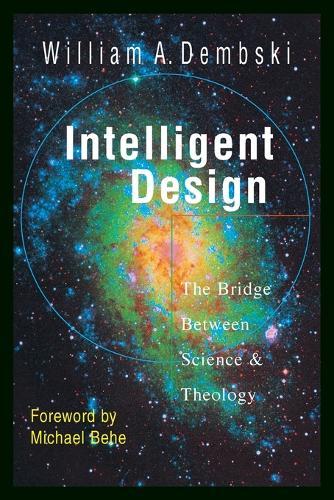Overview
Voted a Book of the Year by Christianity Today The Intelligent Design movement is three things: a scientific research program for investigating intelligent causes an intellectual movement that challenges naturalistic evolutionary theories a way of understanding divine action Although the fast-growing movement has gained considerable grassroots support, many scientists and theologians remain skeptical about its merits. Scientists worry that it's bad science (merely creationism in disguise) and theologians worry that it's bad theology (misunderstanding divine action). In this book William Dembski addresses these concerns and brilliantly argues that intelligent design provides a crucial link between science and theology. Various chapters creatively and powerfully address intelligent discernment of divine action in nature, why the significane of miracles should be reconsidered, and the demise and unanswered questions of British natural theology. Effectively challenging the hegemony of naturalism and reinstating design within science, Dembski shows how intelligent design can be unpacked as a theory of information. Intelligent Design is a pivotal, synthesizing work from a thinker whom Phillip Johnson calls ""one of the most important of the design theorists who are sparking a scientific revolution by legitimating the concept of intelligent design in science.""
Full Product Details
Author: William A. Dembski ,
Michael Behe
Publisher: InterVarsity Press
Imprint: Inter-Varsity Press,US
Dimensions:
Width: 15.20cm
, Height: 2.10cm
, Length: 22.70cm
Weight: 0.479kg
ISBN: 9780830823147
ISBN 10: 083082314
Pages: 312
Publication Date: 12 July 2002
Audience:
College/higher education
,
Professional and scholarly
,
Undergraduate
,
Postgraduate, Research & Scholarly
Format: Paperback
Publisher's Status: Active
Availability: In Print

This item will be ordered in for you from one of our suppliers. Upon receipt, we will promptly dispatch it out to you. For in store availability, please contact us.
Reviews
Intelligent Design is organized into three parts: the first part gives an introduction to design and shows how modernity--science in the last two centuries--has undermined our intuition of this truth. The second and central part of the book examines the philosophical and scientific basis for intelligent design. The final part shows how science and theology relate coherently and how intelligent design establishes the crucial link between the two. This suggests that Dembski is not simply rejecting Darwin and naturalism on fundamentalist or biblical grounds. While grounded in faith, he wishes to show how God's design is accessible to scientific inquiry. As such, the book should be of interest to all thinking believers. --Amazon.com
'Einstein once remarked that the most incomprehensible thing about the world is that it is comprehensible.' This statement, quoted by William Dembski, is a way of summarizing intelligent design theory, which argues that it is possible to find evidence for design in the universe. The author of The Design Inference (a scholarly exploration of this topic published by Cambridge University Press) in this book aims to show the lay reader 'how detecting design within the universe, and especially against the backdrop of biology and biochemistry, unseats naturalism'--and above all Darwin's expulsion of design in his theory of evolution. Intelligent Design is organized into three parts: the first part gives an introduction to design and shows how modernity--science in the last two centuries--has undermined our intuition of this truth. The second and central part of the book examines the philosophical and scientific basis for intelligent design. The final part shows how science and theology relate coherently and how intelligent design establishes the crucial link between the two. This suggests that Dembski is not simply rejecting Darwin and naturalism on fundamentalist or biblical grounds. While grounded in faith, he wishes to show how God's design is accessible to scientific inquiry. As such, the book should be of interest to all thinking believers. --Amazon.com
Dembski is perhaps the very brightest of a new generation of scholars who are willing to challenge the most sacred twentieth-century intellectual idol--the unproven notion that all of life can be explained in terms of natural selection and mutations. --Henry F. Schaeffer III, Graham Perdue Professor and director, Center for Computational Quantum Chemistry, University of Georgia
Author Information
William Dembski (Ph.D., mathematics, University of Chicago; Ph.D., philosophy, University of Illinois at Chicago) is senior fellow of the Discovery Institute's Center for Science and Culture.He has previously taught at Northwestern University, the University of Notre Dame, and the University of Dallas. He has done postdoctoral work in mathematics at MIT, in physics at the University of Chicago, and in computer science at Princeton University, and he has been a National Science Foundation doctoral and postdoctoral fellow. Dembski has written numerous scholarly articles and is the author of the critically acclaimed The Design Inference (Cambridge), Intelligent Design (InterVarsity Press) and No Free Lunch: Why Specified Complexity Cannot Be Purchased without Intelligence (Rowman and Littlefield). Behe earned a Ph.D. in biochemistry from the University of Pennsylvania. He is currently professor of biological sciences at Lehigh University. Behe's research focuses on the structure and function of chromatin and has been funded by the National Institutes of Health and the National Science Foundation. In his book Darwin's Black Box: The Biochemical Challenge to Evolution (Free Press), Behe argues that the irreducible complexity of cellular biochemical systems shows that they were designed by an intelligent agent. Darwin's Black Box has been reviewed in Science, Nature, New Scientist, National Review, the Wall Street Journal and the New York Times. It was selected as Christianity Today's 1996 Book of the Year. Behe is a member of the Biophysical Society and the American Society for Molecular Biology and Biochemistry. He is also a fellow of the Discovery Institute's Center for the Renewal of Science and Culture.



